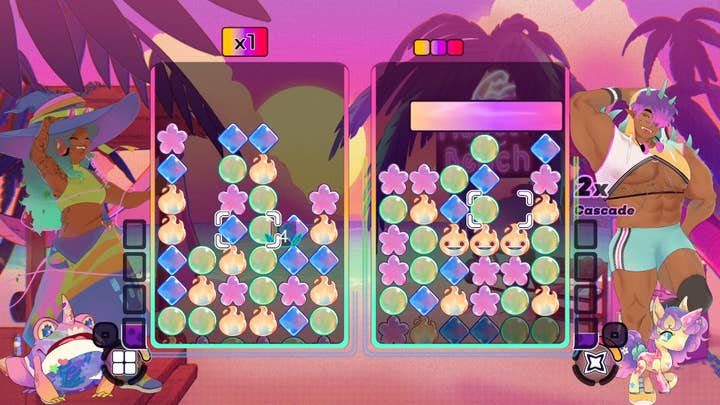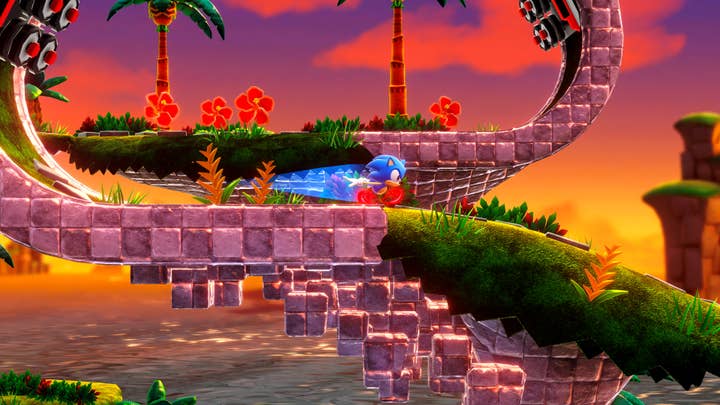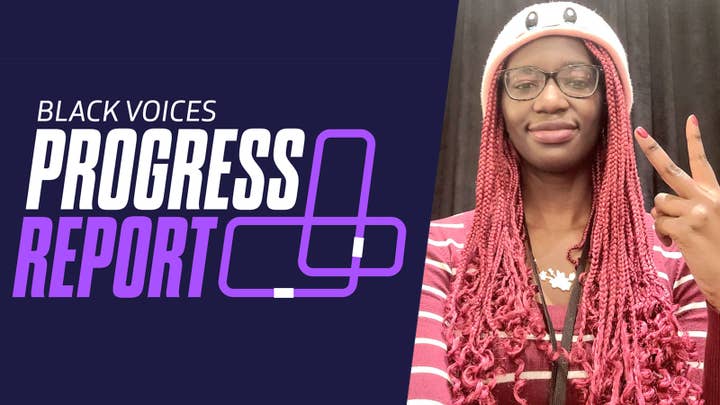The power in granting access to the gaming industry | Black Voices Progress Report
Writer and narrative designer Adanna Nedd didn't know writing for games was a real job – now she's helping the next generation of Black game developers
Sign up for the GI Daily here to get the biggest news straight to your inbox
This interview is part of GamesIndustry.biz's Black Voices Progress Report, offering insight into the different experiences Black professionals have in the games sector. You can read more about the project and check out the other entries on this page.
Many game developers love data, whether it comes as a spreadsheet, a pie chart or a feedback box – so in some ways, Adanna Nedd's move from academic research to game development isn't all that surprising.
During her time as a student at State College, Pennslyvania in 2021, Nedd worked as a research fellow for the iSchool Inclusion Institute (i3), which prepares students from underrepresented backgrounds for postgraduate study in computer sciences. Two research projects she worked on focused on purchasable skins in games, leading Nedd to consider the intersection between representation and games, which is still important to her.
"My research was focused on looking how and why players of colour would buy the in-game skins they buy in online games like Overwatch or Fortnite," Nedd tells GamesIndustry.biz. "We were looking into this because in these games, you don't see a lot of diverse skins. You don't see a lot of skins of characters who look like me.
"I find it amazing that you can just start making games, so all people have to know is where to find the information"
"So when you have all of these players trying to represent themselves, how can they represent themselves if the options aren't available? We found out that the majority of players, whenever they pick their in-game skins [for] aesthetic purposes instead of actually looking like themselves in real life, they do note the lack of diversity."
After these projects, Nedd found she "didn't like to write research papers all that much," and decided to look for something else. The inspiration for what that something else would be came from POC in Play's presence on X the years before; the organisation had called on developers who would be open to being approached with questions by Black students. she realised not only how many different disciplines there were, but also how many Black people worked in the industry.
"I didn't even know game developer or games writer were actual jobs you could have," Nedd says. "I reached out to something between 50 and 80 people, just to find out what their jobs were and what their day-to-day was like. I needed to learn what it means to write for games specifically, and that you didn't need to go to a big university and get a degree to do it."
When Nedd asked what the industry was like, she got what she describes as "mixed responses" – entering and staying in the industry is notoriously difficult, and many developers were open about it.
"Looking at how it's going in the industry right now, I would like to look back at these messages again," Nedd says. "Back then I was definitely more focused on what the work entailed."

A chat with Sweet Baby Inc. founder Kim Belair eventually provided a turning point for Nedd, leading to a pivotal moment in her career.
"After talking to Kim, I was ready to start working on my portfolio, and thanks to the help from and recommendation by the kind folks at Sweet Baby, I started working on Spirit Swap," she says.
To Nedd, being able to easily find and connect with other professionals, especially through an initiative geared towards Black people is definitely a sign the industry is becoming more diverse.
"I hope that by the time these kids grow up, the industry will be a better place for them"
"Learning about more programs specifically meant to help people of colour get into the games industry, like Black in Gaming, Black Voices in Gaming, POC in Play, was great. Seeing these organisations grow has been amazing – a lot of them didn't exist when I was younger."
Now, Nedd is introducing game development to students of colour herself.
"Last year, I mentored for a programme called Gameheads, which is mostly directed at students of colour. That definitely wasn't around when I was in high school," she says.
"I also teach game development to elementary schoolers because one of my old elementary school teachers reached out when she saw I work in games. It's a thing a lot of kids like to engage with. So I let them play Sonic on my Switch and explain things like how a level wouldn't be fun without obstacles and had them draw out little levels."
Does she tell any students that the realities of being a game developer of colour can be quite harsh?
"I think it's kind of hard because you don't want to tell young people that the industry has a really big race problem and that once they're a certain shade, it's going to be infinitely more difficult, but you also don't want to sugarcoat it and say everything's great. People who find out about game development are often so excited to find out more, I want to help with that. I hope that by the time these kids grow up, the industry will be a better place for them."
Even though parts of the Black experience in the gaming industry can be difficult to talk about, Nedd is connecting with Black peers and passing on her knowledge. At DreamCon 2023, Nedd was part of a panel titled The Exaggerated Swagger of a Black Game Dev, which focused on the experiences of Black game developers. The panel received such positive feedback Nedd repeated the format for Magfest 2024.
"One of the most important moments of Magfest was when me and some of the panellists went to a restaurant. There was this little cheesecake shop and it was Black-owned. The owner was familiar with Magfest and was so excited when we explained that we were game developers. She'd never seen any Black game developers before. I want to keep making these connections."
"Learning about programs specifically meant to help people of colour get into the games industry, like Black in Gaming, Black Voices in Gaming, POC in Play, was great – a lot of them didn't exist when I was younger"
Nedd has also held talks on narrative design and character design and offers her own free narrative resources sheet.
"There are just so many free resources out there, especially on YouTube. Stuff like what's UI and UX, how does sound design work, how to make a portfolio – anything, really," Nedd says. "I find it amazing that you can just start making games, so all people have to know is where to find the information.
"I'm a big fan of [Masahiro] Sakurai's Youtube videos, it's incredible that someone who has been in the industry for so long would pass on his knowledge that way. These things have been super helpful, because at first I didn't even know what narrative design was, or how much of game writing is also programming."
Nedd's current project as a game writer, the upcoming Spirit Swap: Lo-Fi Beats To Match-3 To, is a perfect opportunity for her to combine her passion for diverse casts, romance and magical girl tropes – something that's also evident in her projects such the dating sim KISS U, with developers Babs Tarr and Sam Thurman. As part of GDC 2024, Nedd will give a talk on how to craft great romanceable characters, one of her favorite topics, which she has also previously covered at PAX.
"At first I was a little apprehensive because I didn't know how much interest there would be in a talk about romance options," Nedd says, "But the reception at PAX was really good, and with a game like Baldur's Gate 3, there is so much talk about the topic – I read that over 650,000 players finished at least one romance option in the game."

Currently, Nedd works in games part-time as a contractor, while also working a day job in IT. While she would like to move into the gaming industry full-time, she acknowledges how difficult that is, especially given the current wave of redundancies, so a job in a different field affords her a certain peace of mind. She has already learned, however, that to her the team will always be more important than the project.
"Of course I have absolute dream projects, like working on a Kirby game or a Sonic game," she says, "But I really just want to work with a good team, because the whole team at Spirit Swap was so amazing and the whole experience so great, and those are the experiences I want to continue having."
"I already know what it's like to be the only Black person in certain situations, and that there are fewer networking opportunities for Black people"
For now, Nedd is content to wait and see how things in the industry will turn out.
"I think Spirit Swap was already a really big high for me and it allowed me to work on the kind of diverse characters I want to see more of, but I have so many friends with cool projects that are just missing the funding, and even though it feels as if there are still a lot of ways [to get that], I feel you can see that publishers have become more apprehensive with less funding available than in 2020 or 2021," Nedd says.
In the end, as for most developers, money and access are barriers Nedd is still working to overcome.
"As someone with a background in IT, I already know what it's like to be the only Black person in certain situations, and I know that there are often fewer networking opportunities for Black people," she says.
"But the interest is there. I want more support systems in place for developers or people who are just interested in starting out so that there's not a big financial risk to them if they decide, 'Hey, I want to go to GDC and see what game development is like', and that's all about money."
Sign up for the GI Daily here to get the biggest news straight to your inbox









